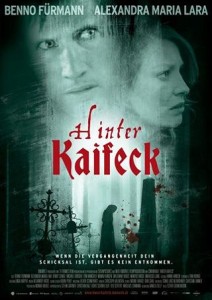Starring: Benno Fürmann, Henry Strange, Alexandra Maria Lara
Ah, the countryside, so serene and peaceful. Yeah, right, unless it’s the remote Bavarian village of Kaifeck. Like Tom Waits sang, there’s always some killing you gotta do around the farm.
Photographer Marc Barenberg (Fürmann) and his son Tyll (Strange) are on a tour of the Bavarian hinterlands. They’re looking for the last traces of rural culture and folklore, and they find that in spades in the mist-shrouded Kaifeck. There they still celebrate the old ways, like the annual Epiphany festival, where the locals dress as wild spirits or percheta to chase away the devil.
Cinematic wisdom makes it clear that city-types with nice cars should steer clear of remote villages. Half of Kaifeck is a little too glad to see Barenberg and the other half is quietly hostile. And then there of the dreams of a brutal and unsolved mass slaying in an abandoned house a century ago, and his sudden attacks of sleep walking in the bogs and forests.
Originally known as Hinter Kaifeck (Behind Kaifeck), that title may represent this tale of mystery. Echoes of the original grim tales of the Brother Grimm, the ancient legend of the Wild Hunt, and a passing nod toThe Whicker Man wed this tale deeply to the rural horror tradition, where something terrible lurks in the hinterland. Fürmann plays the role of the buttoned-down contemporary man ensnared in myth, backed by the normal assortment of odd-looking yokels. His turn as unwilling detective (partnered with Downfall‘s Lara as the obligatory attractive inn-keeper) may be a somewhat predictable peeling back of the village’s dirty secrets. Yet Fürmann provides a clenched-jawed center to the events, grounding it when it could have slipped into half-baked fantasy.
Can this, as so many people seem to be hoping, become the next Let The Right One In? It has the potential to be the next breakout European art house horror without repeating the formula. Director Gronenberg catches the same icy muddiness of the central European winter, but the themes of adult disaffection (and a lack of a Smiths-referencing title) may mean it stays more art house than breakout. That doesn’t alter the fact that this is ideal for anyone who enjoys their terror with a Teutonic tone.
